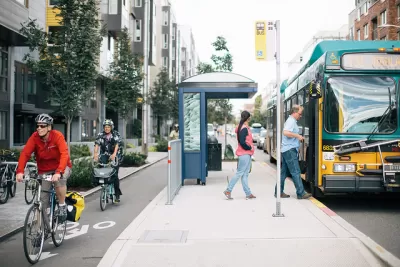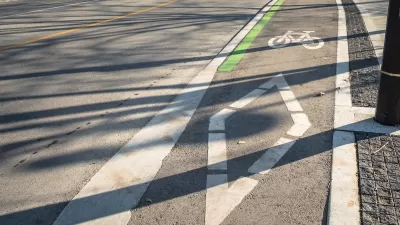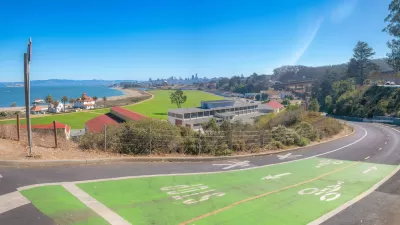A stakeholder group hopes to create a pedestrian- and business-friendly streetscape in Downtown Seattle.

The Downtown Seattle Association has put forth several versions of a vision to transform Third Avenue—a busy corridor that sits at the center of the city's work to update its Transit Master Plan and implement its One Center City framework.
More than 52,000 passengers ride buses along Third Avenue every day. But over the next few years, the opening of the East Link, Lynnwood Link, and Federal Way Link light rail extensions might draw some of those riders away. In anticipation, the Downtown Seattle Association hopes to refocus Third Avenue bus service on connections to rail, as well as to reduce overall street space for both autos and buses (while preserving bus-only lanes) to provide more sidewalk space for retail.
In The Urbanist, Stephen Fesler compares several concepts put forth by the association, analyzing their advantages and drawbacks and including renderings. All proposals consider urban design, public space, activating ground-floor spaces, transportation operations, and long-term public-private management of the corridor. Any adopted plan would likely be phased in through 2035.
FULL STORY: Downtown Seattle Association Envisions A New Multimodal Third Avenue

Planetizen Federal Action Tracker
A weekly monitor of how Trump’s orders and actions are impacting planners and planning in America.

Maui's Vacation Rental Debate Turns Ugly
Verbal attacks, misinformation campaigns and fistfights plague a high-stakes debate to convert thousands of vacation rentals into long-term housing.

Restaurant Patios Were a Pandemic Win — Why Were They so Hard to Keep?
Social distancing requirements and changes in travel patterns prompted cities to pilot new uses for street and sidewalk space. Then it got complicated.

In California Battle of Housing vs. Environment, Housing Just Won
A new state law significantly limits the power of CEQA, an environmental review law that served as a powerful tool for blocking new development.

Boulder Eliminates Parking Minimums Citywide
Officials estimate the cost of building a single underground parking space at up to $100,000.

Orange County, Florida Adopts Largest US “Sprawl Repair” Code
The ‘Orange Code’ seeks to rectify decades of sprawl-inducing, car-oriented development.
Urban Design for Planners 1: Software Tools
This six-course series explores essential urban design concepts using open source software and equips planners with the tools they need to participate fully in the urban design process.
Planning for Universal Design
Learn the tools for implementing Universal Design in planning regulations.
Heyer Gruel & Associates PA
JM Goldson LLC
Custer County Colorado
City of Camden Redevelopment Agency
City of Astoria
Transportation Research & Education Center (TREC) at Portland State University
Jefferson Parish Government
Camden Redevelopment Agency
City of Claremont




























